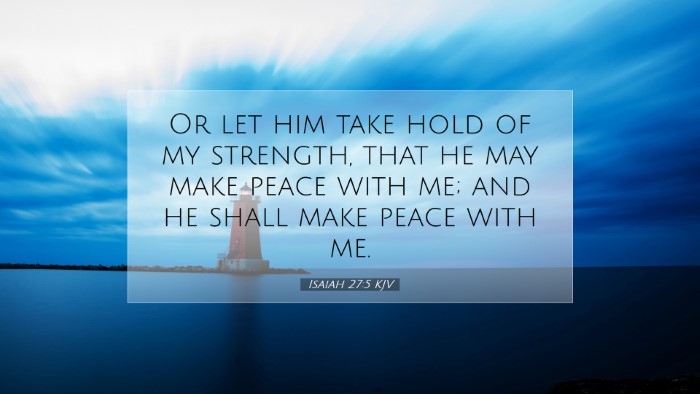Commentary on Isaiah 27:5
Verse Reference: Isaiah 27:5 - "Or let him take hold of my strength, that he may make peace with me; and he shall make peace with me."
Introduction
Isaiah 27:5 serves as a profound declaration on the nature of God’s invitation to His people—a call to embrace His strength in order to achieve true peace. Understanding this verse requires delving into its context within the book of Isaiah and its implications for both ancient Israel and modern readers.
Contextual Analysis
The broader context of Isaiah 27 portrays God’s promise of restoration and protection for Israel. This chapter addresses the ultimate defeat of Israel's adversaries and the assurance of a coming time when God's people will be gathered and secured. Isaiah uses vineyard imagery to describe Israel, emphasizing God’s care and watchfulness.
Exegesis of the Text
Taking Hold of Strength
“Or let him take hold of my strength” suggests a proactive approach to seeking God. Matthew Henry emphasizes that this call to 'take hold' entails an acknowledgment of our own weakness and an earnest desire to rely on divine strength. It reflects humility and submission, crucial attitudes for anyone seeking to align themselves with God's will.
The Pursuit of Peace
The phrase "that he may make peace with me" denotes the fundamental relational aspect of peace in the biblical sense. Adam Clarke notes that peace with God is foundational to spiritual stability and addresses the human condition's innate conflict with God due to sin. This peace is not merely the absence of conflict but signifies a deep, abiding relationship built on trust and fidelity.
Divine Assurance
“and he shall make peace with me” assures that peace is not only possible but certain if one turns to God. Albert Barnes highlights this as a promise of reconciliation, where the initiative lies with God, underscoring His readiness to forgive and embrace those who seek Him earnestly. This reflects the overarching theme of grace throughout scripture.
Theological Reflection
This verse invites significant theological reflection on God’s character. He is portrayed not merely as a judge but as one who desires reconciliation. The call to “take hold” illustrates how God's strength can transform human lives, leading to restored relationships—both vertically (with God) and horizontally (with others).
Implications for Believers
Isaiah 27:5 provides rich implications for pastors, students, and theologians seeking to understand the dynamics of faith:
- Hope in Weakness: Believers are reminded that in their moments of weakness, they are encouraged to seek God’s strength, which is a source of hope and sustenance.
- Call to Action: The imperative nature of “take hold” speaks to the active participation of believers in their faith journey.
- Peace as a Gift: The assurance of peace with God invites believers to embrace a life marked by assurance and inner peace, stemming from the relationship with the Divine.
Conclusion
Isaiah 27:5 vibrantly encapsulates the heart of God’s desire for humanity: a deep connection that fosters spiritual peace and strength. It speaks profoundly to all who are weary and conflict-ridden, inviting them to draw near to the One who offers true peace through strength. Pastors can leverage this insight to offer hope to congregations; students and theologians may explore the intricate relationship between weakness, strength, and peace in their studies.


